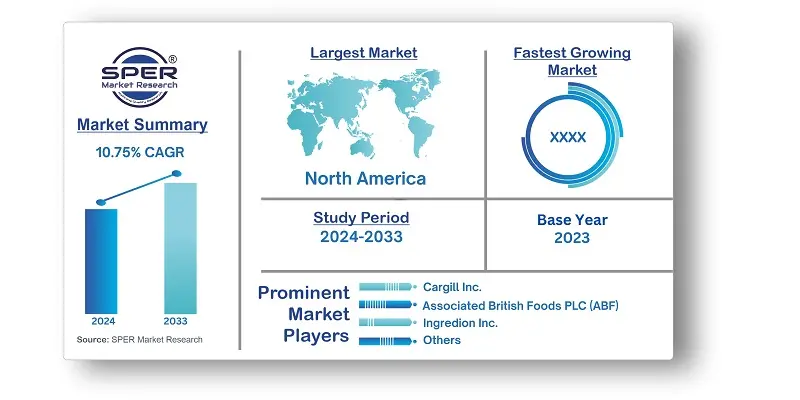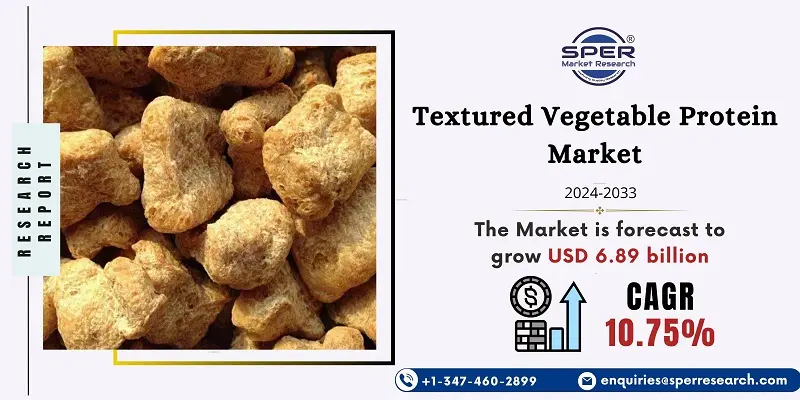
Textured Vegetable Protein Market Trends, Share, Size, Revenue, Demand and Future Outlook
Textured Vegetable Protein Market Growth, Size, Trends Analysis– By Type, By Nature, By Form, By Application- Regional Outlook, Competitive Strategies and Segment Forecast to 2033
| Published: Oct-2024 | Report ID: FOOD24111 | Pages: 1 - 232 | Formats*: |
| Category : Food & Beverages | |||
- June 2023; With the goal of promoting innovation and hastening the launch of new products, Roquette Freres announced the opening of Roquette's Food Innovation Centre, which will offer formulators a wide range of capabilities, including labs, scale-up testing, technical and R&D support, and state-of-the-art equipment.
- May 2023; In North America, Univar Solutions established a partnership with ICL's Rovitaris textured plant proteins. Univar hopes to give consumers in the US and Canada more alternatives when it comes to plant-based protein for food components thanks to this arrangement.


| Report Metric | Details |
| Market size available for years | 2020-2033 |
| Base year considered | 2023 |
| Forecast period | 2024-2033 |
| Segments covered | By Type, By Nature, By Form, By Application. |
| Regions covered | North America, Asia-Pacific, Latin America, Middle East & Africa, and Europe. |
| Companies Covered | AGT Food & Ingredients Inc, Associated British Foods PLC, Bob’s Red Mill Natural Foods, Bunge Limited, Cargill Inc, China Foodstuff & Protein Group Co. Ltd, CHS Inc, Dixie Foods, Ingredion Inc. |
- Food and beverage manufacturers
- Plant-based product companies
- Vegan and vegetarian food producers
- Nutritional supplement manufacturers
- Retailers and supermarkets
- Wholesalers and distributors
- Restaurants and foodservice providers
- Research and development institutions
| By Type: | |
| By Nature: | |
| By Form: | |
| By Application: |
- Global Textured Vegetable Protein Market Size (FY’2024-FY’2033)
- Overview of Global Textured Vegetable Protein Market
- Segmentation of Global Textured Vegetable Protein Market By Type (Soy, Wheat, Pea)
- Segmentation of Global Textured Vegetable Protein Market By Nature (Organic, Inorganic)
- Segmentation of Global Textured Vegetable Protein Market By Form (Chunks, Slice, Flakes, Granules)
- Segmentation of Global Textured Vegetable Protein Market By Application (Meat Alternatives, Snacks Foods, Bakery, Animal Feed)
- Statistical Snap of Global Textured Vegetable Protein Market
- Expansion Analysis of Global Textured Vegetable Protein Market
- Problems and Obstacles in Global Textured Vegetable Protein Market
- Competitive Landscape in the Global Textured Vegetable Protein Market
- Impact of COVID-19 and Demonetization on Global Textured Vegetable Protein Market
- Details on Current Investment in Global Textured Vegetable Protein Market
- Competitive Analysis of Global Textured Vegetable Protein Market
- Prominent Players in the Global Textured Vegetable Protein Market
- SWOT Analysis of Global Textured Vegetable Protein Market
- Global Textured Vegetable Protein Market Future Outlook and Projections (FY’2024-FY’2033)
- Recommendations from Analyst
1.1. Scope of the report1.2. Market segment analysis
2.1. Research data source
2.1.1. Secondary Data2.1.2. Primary Data2.1.3. SPERs internal database2.1.4. Premium insight from KOLs
2.2. Market size estimation
2.2.1. Top-down and Bottom-up approach
2.3. Data triangulation
4.1. Driver, Restraint, Opportunity and Challenges analysis
4.1.1. Drivers4.1.2. Restraints4.1.3. Opportunities4.1.4. Challenges
4.2. COVID-19 Impacts of the Global Textured Vegetable Protein Market
5.1. SWOT Analysis
5.1.1. Strengths5.1.2. Weaknesses5.1.3. Opportunities5.1.4. Threats
5.2. PESTEL Analysis
5.2.1. Political Landscape5.2.2. Economic Landscape5.2.3. Social Landscape5.2.4. Technological Landscape5.2.5. Environmental Landscape5.2.6. Legal Landscape
5.3. PORTERs Five Forces
5.3.1. Bargaining power of suppliers5.3.2. Bargaining power of buyers5.3.3. Threat of Substitute5.3.4. Threat of new entrant5.3.5. Competitive rivalry
5.4. Heat Map Analysis
6.1. Global Textured Vegetable Protein Market Manufacturing Base Distribution, Sales Area, Product Type6.2. Mergers & Acquisitions, Partnerships, Product Launch, and Collaboration in Global Textured Vegetable Protein Market
7.1. Global Textured Vegetable Protein Market Size, Share and Forecast, By Type, 2020-20267.2. Global Textured Vegetable Protein Market Size, Share and Forecast, By Type, 2027-20337.3. Soy7.4. Wheat7.5. Pea
8.1. Global Textured Vegetable Protein Market Size, Share and Forecast, By Nature, 2020-20268.2. Global Textured Vegetable Protein Market Size, Share and Forecast, By Nature, 2027-20338.3. Inorganic8.4. Organic
9.1. Global Textured Vegetable Protein Market Size, Share and Forecast, By Form, 2020-20269.2. Global Textured Vegetable Protein Market Size, Share and Forecast, By Form, 2027-20339.3. Chunks9.4. Slice9.5. Flakes9.6. Granules
10.1. Global Textured Vegetable Protein Market Size, Share and Forecast, By Application, 2020-202610.2. Global Textured Vegetable Protein Market Size, Share and Forecast, By Application, 2027-203310.3. Meat Alternatives10.4. Snacks Foods10.5. Bakery10.6. Animal Feed
11.1. Global Textured Vegetable Protein Market Size and Market Share By Region (2020-2026)11.2. Global Textured Vegetable Protein Market Size and Market Share By Region (2027-2033)11.1. Asia-Pacific
11.1.1. Australia11.1.2. China11.1.3. India11.1.4. Japan11.1.5. South Korea11.1.6. Rest of Asia-Pacific
11.2. Europe
11.2.1. France11.2.2. Germany11.2.3. Italy11.2.4. Spain11.2.5. United Kingdom11.2.6. Rest of Europe
11.3. Middle East and Africa
11.3.1. Kingdom of Saudi Arabia11.3.2. United Arab Emirates11.3.3. Qatar11.3.4. South Africa11.3.5. Egypt11.3.6. Morocco11.3.7. Nigeria11.3.8. Rest of Middle-East and Africa
11.4. North America
11.4.1. Canada11.4.2. Mexico11.4.3. United States
11.5. Latin America
11.5.1. Argentina11.5.2. Brazil11.5.3. Rest of Latin America
12.1. AGT Food & Ingredients Inc
12.1.1. Company details12.1.2. Financial outlook12.1.3. Product summary12.1.4. Recent developments
12.2. Associated British Foods PLC
12.2.1. Company details12.2.2. Financial outlook12.2.3. Product summary12.2.4. Recent developments
12.3. Bobs Red Mill Natural Foods
12.3.1. Company details12.3.2. Financial outlook12.3.3. Product summary12.3.4. Recent developments
12.4. Bunge Limited
12.4.1. Company details12.4.2. Financial outlook12.4.3. Product summary12.4.4. Recent developments
12.5. Cargill Inc
12.5.1. Company details12.5.2. Financial outlook12.5.3. Product summary12.5.4. Recent developments
12.6. China Foodstuff & Protein Group Co. Ltd
12.6.1. Company details12.6.2. Financial outlook12.6.3. Product summary12.6.4. Recent developments
12.7. CHS Inc
12.7.1. Company details12.7.2. Financial outlook12.7.3. Product summary12.7.4. Recent developments
12.8. Dixie Foods
12.8.1. Company details12.8.2. Financial outlook12.8.3. Product summary12.8.4. Recent developments
12.9. Ingredion Inc
12.9.1. Company details12.9.2. Financial outlook12.9.3. Product summary12.9.4. Recent developments
12.9.5. Others
SPER Market Research’s methodology uses great emphasis on primary research to ensure that the market intelligence insights are up to date, reliable and accurate. Primary interviews are done with players involved in each phase of a supply chain to analyze the market forecasting. The secondary research method is used to help you fully understand how the future markets and the spending patterns look likes.
The report is based on in-depth qualitative and quantitative analysis of the Product Market. The quantitative analysis involves the application of various projection and sampling techniques. The qualitative analysis involves primary interviews, surveys, and vendor briefings. The data gathered as a result of these processes are validated through experts opinion. Our research methodology entails an ideal mixture of primary and secondary initiatives.



Frequently Asked Questions About This Report
PLACE AN ORDER
Year End Discount
Sample Report
Pre-Purchase Inquiry
NEED CUSTOMIZATION?
Request CustomizationCALL OR EMAIL US
100% Secure Payment






Related Reports
Our Global Clients
Our data-driven insights have influenced the strategy of 200+ reputed companies across the globe.






















